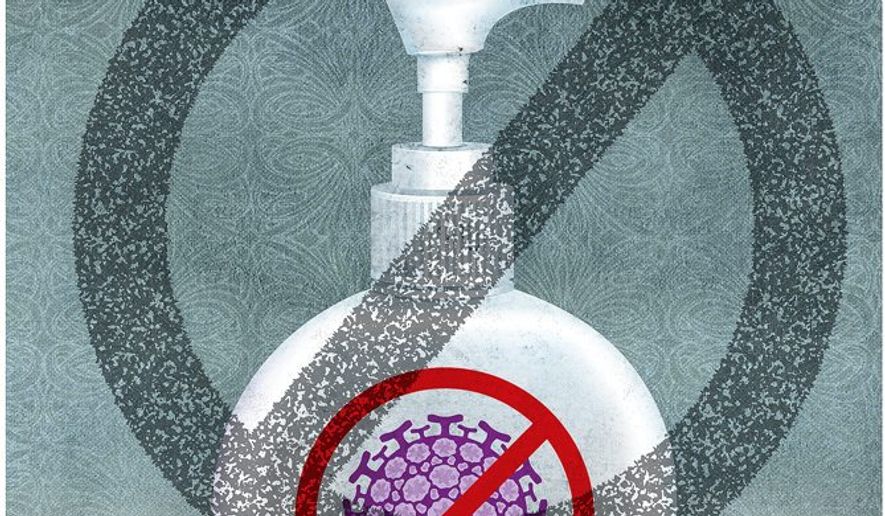OPINION:
The coronavirus pandemic is the most serious global health crisis in modern history. Governments around the world are rushing to support ailing citizens, struggling economies and devastatingly low medical supplies.
Constitutionally, America’s most important function is to protect its citizens. This should include preventing infection or death. That is why it came as such a surprise that the Coronavirus Aid, Relief, and Economic Security Act (CARES), a $2 trillion economic stimulus package recently passed by Congress, left out investments in sanitizers and hand soaps. According to the Centers for Disease Control and Prevention (CDC) these items are crucial to preventing the spread of COVID-19.
While the United States is normally a role model for the rest for the world, at times it has struggled to find its footing during this crisis. As the scale of this public health emergency started to spread, we found ourselves woefully behind in producing key materials to combat the coronavirus, including ventilators, personal protective equipment (PPE), as well as alcohol-based hand sanitizers and soaps.
Any future COVID-19 response packages that fail to invest in this first line defense will not only accelerate the spread of the virus but will also thwart President Trump’s goal of jumpstarting the economy, ensuring that civil society remains in fear behind closed doors.
Let’s cut to the chase. The U.S. stock of ventilators is shockingly low. Things have gotten so serious in New York, the current epicenter of the COVID-19 crisis in the United States, that Gov. Andrew Cuomo last week reported that treatment protocols in the state had shifted to allow two patients share one ventilator.
Federal officials, meanwhile, have confirmed that the stockpile of personal protective equipment (PPE) is limited. Even the U.S. Department of Health and Human Services (HHS) admits our nation’s strategic reserve was little match for this outbreak. HHS Secretary Alex Azar warned Congress last month that reserves of 12 million respirator masks recommended for health care workers would not be enough. The availability of consumer-ready hand sanitizer, cleaning materials and disinfectants has also become so scarce that people are going to jail for price-gouging.
The shortage of PPE has simply been described by The New York Times as “dire” at this point. States have begun infighting with federal officials over how equipment and supplies are being doled out and have even gotten into bidding wars over the procurement of this equipment. If this situation persists, we could see citizens publicly quarreling over basic necessities like hand sanitizer, soap and masks. Something must be done.
Recognizing this unparalleled national security threat to our nation President Trump has invoked the Defense Production Act, providing broad presidential powers to order domestic manufacturers to produce critical items during this crisis. But unlike industries for other essential items; hand sanitizer, hand soap and medical-grade cleaning supply manufacturers — products CDC guidance recommends using to prevent the spread of COVID-19 — have surprisingly not been included in any major conversations regarding public-private partnerships.
Respiratory viruses like COVID-19 spread when mucus or droplets containing the virus enter your body through your eyes, nose or throat. Health officials and the FDA have indicated that hand sanitizer is the best alternative when washing your hands with soap and water is not possible or convenient. In health care settings, meanwhile, the CDC says that hand sanitizer is a preferred way to keep clean hands.
Therefore, with all of the talk of General Motors, Ford, GE, 3M and others getting involved in partnerships to help produce medical equipment like ventilators for patients and masks for health care workers, it is shocking that the attention paid to alcohol-based hand sanitizers and soaps has been almost non-existent. Only private alcohol and spirits’ distillers have stepped up to offer their own variety of sanitizer. While these efforts are admirable, these businesses do not possess the production capability to meet demand and in most cases their products do not meet FDA standards.
The bottom line is that although ventilators, PPE and other medical supplies are invaluable in this COVID-19 fight, they are only half of the arsenal. We simply cannot afford to lose lives because we are inadequately producing and supplying hygiene and disinfectant products.
As Congress looks to defend America from COVID-19 in what Mr. Trump has declared as a war, it is crucial that the government and private sector give hand hygiene products top priority. Without a concerted effort to equip our citizens with the basic necessities to “defend and prevent,” our nation might not be able to hold its sanitizing line of defense.
• Gary D. Alexander served as Pennsylvania’s Human Services Secretary from 2011-2013 and Rhode Island’s Secretary of Health and Human Services from 2006-2011.




Please read our comment policy before commenting.